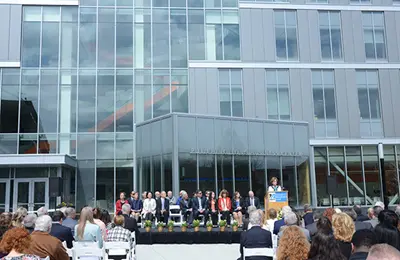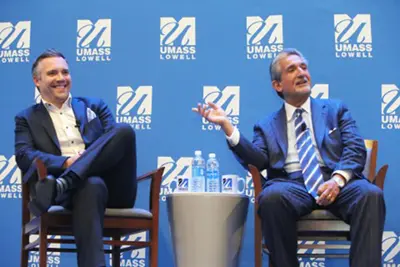Manning School Fields First Team for International Business Ethics Case Competition
 Image by Ed Brennen
Image by Ed Brennen
04/06/2018
By Ed Brennen
The Market Basket saga has provided Manning School of Business students with a wealth of classroom lessons in recent years. The story of employees and customers rallying around ousted CEO Arthur T. Demoulas is required reading for freshmen in the business school, and the university launched its new Donahue Center for Business Ethics and Social Responsibility last semester with a special screening of a documentary film on the grocery empire’s family feud.
So it’s only fitting that a team of five Manning School students — seniors Shakeem Browne, Maya Crawford, Evan Cotreau and Kelly Skelton and junior Elianna Makiej — chose to use Market Basket as their case study at the upcoming International Business Ethics Case Competition (IBECC), April 18-20 at the Boston Marriott Copley Place.
“It’s a powerful story that hits home for a lot of us,” says Makiej, a Dracut native who is majoring in business administration with concentrations in marketing and management. “It was a movement that made national news and affected so many people. Everyone got involved over one man and was motivated to do what was ethically right.”
This is the first time Manning School students will compete at IBECC, the most venerable business ethics competition in the country. Now in its 22nd year, IBECC attracts 40 teams of undergraduate and graduate students from business schools around the world. This year’s competition includes teams from Hong Kong, Australia, Kuwait and Oxford, England, as well as from U.S. schools such as Arizona State University, Boston College, Bentley University and UMass Amherst.
“I really liked the ethics class — I’ve already started applying things I learned in my everyday life.” -MSB Senior Maya Crawford
“It’s an incredible honor to be on our school’s inaugural team. I hope we can open the door for future teams from the university,” says Skelton, a business administration major from Billerica with concentrations in marketing and management. “Competing against schools from all over the world is a cool way to boost our business experience.”
The UMass Lowell team is led by visiting instructor Elissa Magnant, co-director of the Donahue Center along with Asst. Prof. Erica Steckler. Magnant pitched the idea of an IBECC team to students in her business ethics course last semester. The five students who raised their hands have been meeting regularly this spring to prepare for the competition.
“I really liked the ethics class — I’ve already started applying things I learned in my everyday life — and I wanted to see where this would go,” says Crawford, a business administration major from Boston who has a concentration in entrepreneurship.
“These students get to step out into this world of business ethics in a way that we haven’t done before,” says Steckler, who describes the students as “thought leaders.” She adds that competing against top business schools — in front of judges who are leaders in industry — is an important initiative for both the Manning School and the university.
The Donahue Center is a sponsoring partner of this year’s competition (along with Raytheon, the Wells Fargo Foundation and Meggitt, a UK-based engineering firm), providing the center with valuable exposure on the global stage.
“Having a presence at the competition is huge, both for our students competing and the university as a whole,” says Manning School Dean Sandy Richtermeyer. “The university has demonstrated a very strong commitment that puts us at the forefront with top organizations committed to ethics education.”
 Image by Ed Brennen
Image by Ed Brennen
The competition itself includes three events: a 25-minute presentation by three to five team members (followed by Q&A and feedback from judges); a 10-minute presentation by two to three team members; and a 90-second presentation by just one team member.
Teams come to the event with a prepared one-page executive summary of their case. During their presentations, students play the role of consultants speaking to a company’s senior executives about the importance of doing business profitably while at the same time acting ethically. Teams are scored on how well they address the legal, financial and ethical dimensions of their case, as well as on their overall persuasiveness and presentation skills.
“We’ve all taken professional communications, so I’m confident we’ll get out there and do a good job,” says Browne, a business administration major from Boston with concentrations in management and marketing. “The important thing is to be prepared ahead of time and know the case.”
Magnant wondered if the students, especially the four seniors in their final semester as undergrads, would have the bandwidth to commit to the team.
“But they have been exemplary,” says Magnant, who early in the semester hosted a team dinner at her home where they watched the Market Basket documentary and began preparing their case study.
“I respected Prof. Magnant and appreciated that she wanted to do this,” Browne says when asked why he joined the team. “I was willing to take a chance. I believe in her, and I believe in us.”



